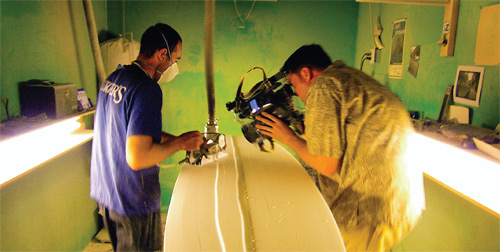
Terry Martin has been carving surfboards for 55 years, 40 of those for Hobie Sports. He has personally “shaped” more than 70,000 surfboards. His is just one of the stories explored in a new film, Shaped, produced and directed by Walter Georis, a Carmel restaurateur, winery owner and musician. The movie is a homage to the people who made the surfing industry what it is today. And according to the Surf Industry Manufacturers Association, it’s big: U.S. retail sales of surf equipment topped $7.22 billion in 2008.
The job of a shaper is to take a blank piece of material and carve it into a wave-worthy shape. It’s as much an art as it is a trade. Shapers are both sculptors and engineers in that they possess a keen eye for symmetry and an innate sense of how a design will behave in the water. Georis became fascinated with the craft while visiting his boyhood town of San Clemente.
Incidentally, the new filmmaker is not and has never been a surfer. He is a guitarist, however, and as a young man was inThe Sandals, a surf band that gained fame by writing and recording the theme to The Endless Summer, Bruce Brown’s 1966 paean to the surfing lifestyle (the most successful group of the surf genre, the Beach Boys, didn’t surf either). Georis was spending time with an old pal, Sandals’ drummer Danny Brawner, who was in the business of repairing old surfboards. Georis was fascinated by the scene: Barefoot guys, working in these weird conditions like beach-bum alchemists amid Styrofoam dust and a witches’ brew of toxic fiberglass resin chemicals.
“I said to my wife, ‘someone should document this,’ ” Georis says. “So I did.”
“Most surf movies are about the waves, the wipeouts and the chicks,” Georis says. “These guys were responsible for the entire surf industry. I wanted to tip my hat to them.” The result is clearly a labor of love. The film is beautifully photographed by cinematographer Steve Gatlin and features pro surfer (and star of The Endless Summer II ) Robert “Wingnut “Weaver. While there are some technical gaffes—for instance, a fuzzy-covered microphone makes plenty of appearances at the top of the frame—these moments just serve to reinforce the homegrown vibe that the film celebrates. These pioneers of the surf industry were making it up as they went along, and that’s precisely what makes them so interesting.
Interview subjects are treated with reverence and respect and there are some surprises. For instance, it’s revealed at one point that the 1959 beach blanket movie, Gidget, employed a bit of Hollywood trickery: scenes that depict Sandra Dee surfing were actually performed by early pro surfer Mickey Muñoz. The producers put a blond wig on the diminutive surfer and filmed him from afar.
“These guys were never thinking about the future,” says Georis. “They just wanted to live the lifestyle.” Actually, it could be said that the men and women depicted in this film invented the Southern California surf-culture lifestyle. Dick Metz, co-founder of Hobie Sports with Hobart “Hobie” Alter, recalls lazing about on the Laguna Beach sand with his buddies in the 1950s. “Hobie said ‘Instead of listing what you think you might want to be, why not list the things you know you don’t want to do,'” Metz recalls.
The friends came up with a list of three: We don’t ever want a job you have to wear a coat and tie to; we don’t want to ever have to wear hard leather shoes; and we don’t want to ever have to work on the other side of the Pacific Coast Highway. “We never thought about making money.”
The filmmaker’s passion for his subject is palpable. “The project really had a heart to it,” Georis says. “It documented something real, something timely.” A voiceover at the end of the film, speaking on the sport of surfing, states: “Quite simply put, it’s a real, beautiful experience.”
And that’s an apt description for a viewing of Shaped.
Shaped is available at the Georis Winery tasting room, 4 Pilot Road in Carmel Valley; 831/659-1050.